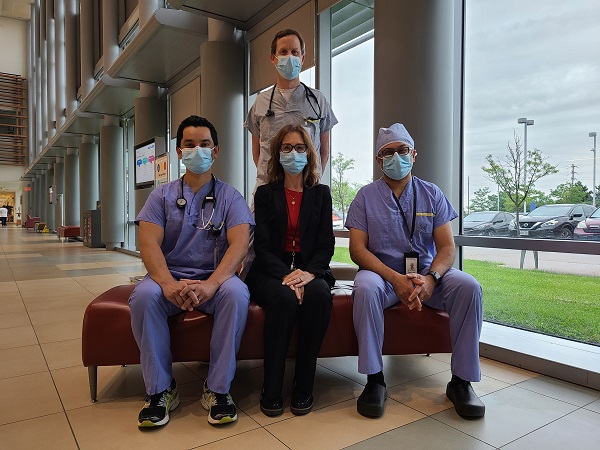By Catalina Guran
When Trevor Meynert began feeling chest discomfort in September 2019, he didn’t think it was anything serious. Two days later, an interventional cardiologist at William Osler Health System’s (Osler’s) Brampton Civic Hospital was inserting a stent into one of his heart’s major arteries to open a complete blockage. He had suffered an ST-elevation myocardial infarction (STEMI), a dangerous type of heart attack, and one that teams at Osler see all too often.
“I walked into the Emergency Department not realizing I was having a heart attack,” said the now 67-year-old. “The emergency and cardiology teams were so efficient and worked like a well-oiled machine. Their timely actions saved my life.”
In 2010, thanks to the generous, combined support of the Tour de Bleu annual cycling fundraiser, the Peter Gilgan Foundation and Mattamy Homes, Osler was able to expand the range of cardiovascular services available at Brampton Civic Hospital. In 2013, the STEMI Program received significant additional support through a gift to William Osler Health System Foundation (Osler Foundation) from Ernest and Gladys Pitman after an excellent care experience.
Today, Osler is home to one of the largest STEMI programs in Ontario, and is one of the top two hospitals in the province for patient outcomes following emergent and elective percutaneous coronary intervention (PCI), a non-surgical procedure that opens blocked arteries using a stent to help return blood flow to the heart. Osler also has one of the fastest “door to balloon” times in the province for what can often be life-saving care during a STEMI.
“Osler sees some of the sickest patients in the province coming through our doors,” said Dr. Masud Khandaker, Osler’s Medical Director, Cardiovascular Health System. “The communities we serve are highly vulnerable to heart disease influenced by a high incidence of diabetes, hypertension, high cholesterol and genetic factors, so timely access to care is critical.”
In response to this high incidence of heart disease, Osler’s cardiovascular program is not only growing, it has attracted a team of highly skilled cardiologists, many of whom specialize in areas like cardiac catheterization, structural heart disease, electrophysiology and cardio-oncology. Among them is Dr. Khandaker, a native Torontonian who received his cardiovascular training at the prestigious Mayo Clinic in Rochester, Minnesota.
“Osler’s cardiovascular team of physicians, nurses, allied health professionals, kinesiologists, technicians, pharmacists and dieticians is second to none, and tremendously dedicated to our patients,” said Dr. Khandaker who is quick to praise his colleagues, Dr. Shy Amlani, Physician Lead, Cardiac Procedures Unit; Dr. Marc Allard, Physician Lead, Acute Cardiac Care Program; and Anne-Marie Graham, Director, Cardiovascular and Chronic Disease, as instrumental leaders in helping to shape Osler’s cardiovascular program. “We all firmly believe in providing every patient with stellar care based on evidence-based best practices.”
It’s that goal that led Dr. Khandaker to reach out to Unity Health’s St. Michael’s Hospital, a centre of excellence in valvular heart disease, to forge a collaborative relationship that enables patient-inspired health care without boundaries. He and a small team of Osler cardiologists perform a delicate diagnostic procedure, known as transesophageal echocardiography (TEE), which takes high definition images of the heart’s structure for patients suspected of having leaking or narrowed valves. These images are then shared virtually among a large team of cardiologists and cardiac surgeons at St. Michael’s Hospital and Osler to rapidly determine the best course of action for each patient.
“We’re harnessing technology and clinical expertise at both hospitals to ensure Osler patients have timely access to the right care,” said Dr. Neil Fam, Director of Interventional Cardiology and Cardiac Catheterization Labs at St. Michael’s Hospital, who worked closely with Dr. Khandaker to develop the hospital collaboration. Dr. Khandaker notes that he looks forward to the day Osler is able to further grow its structural heart disease program, adding “The specialists at St. Michael’s Hospital have been fantastic collaborators.”
Osler is also home to one of the few highly specialized cardio-oncology clinics in Ontario. Launched in the summer of 2021 at Osler’s Peel Memorial Centre for Integrated Health and Wellness, the outpatient clinic monitors cancer patients who are receiving chemotherapy and radiation treatments for any adverse reactions that have the potential to impact the heart.
This specialty clinic connects cancer patients with a cardio-oncologist to assess them for any pre-existing heart disease, or risk factors for heart disease, prior to starting their treatment. The clinic boasts cardiologists who have advanced training in cardio-oncology, are familiar with cancer therapies, and understand the best management strategies to be put in place should the need arise.
“Osler’s cardiovascular program is robust, offering a comprehensive range of services, including cardiac procedures, cardiac diagnostic services, inpatient care and specialized rehabilitation and outpatient clinics,” said Dr. Khandaker. “With continued support from our health care and government partners, Osler Foundation and our community, we will continue to further advance these services. Everything we do is designed to achieve the best outcomes possible for patients.”
Trevor Meynert, who recently completed his annual follow-up visit with Dr. Khandaker, couldn’t agree more. “The after-care is unbelievable. It brings all those stress and anxiety levels down to zero when you know you have someone you can depend on to look out for you year after year. We are so lucky to have this amazing expertise so close to home.”
Catalina Guran is Senior Manager, Public Relations at William Osler Health System.




